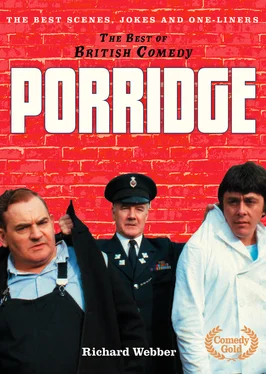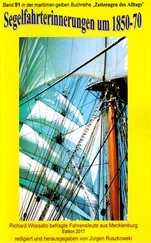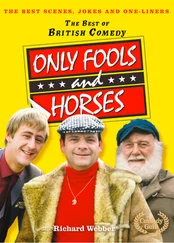THE BEST OF BRITISH COMEDY
THE BEST SCENES, JOKES AND ONE-LINERS
Richard Webber
Introduction
The Story in a Nutshell
‘Prisoner and Escort’ (transmitted 1/4/73)
1. ‘New Faces, Old Hands’ (5/9/74)
2. ‘The Hustler’ (12/9/74)
3. ‘A Night In’ (19/9/74)
4. ‘A Day Out’ (26/9/74)
5. ‘Ways and Means’ (3/10/74)
6. ‘Men Without Women’ (10/10/74)
1. ‘Just Desserts’ (24/10/75)
2. ‘Heartbreak Hotel’ (31/10/75)
3. ‘Disturbing the Peace’ (7/11/75)
4. ‘No Peace for the Wicked’ (14/11/75)
5. ‘Happy Release’ (21/11/75)
6. ‘The Harder They Fall’ (28/11/75)
‘No Way Out’ (24/12/75)
‘The Desperate Hours’ (24/12/76)
1. ‘A Storm in a Teacup’ (18/2/77)
2. ‘Poetic Justice’ (25/2/77)
3. ‘Rough Justice’ (4/3/77)
4. ‘Pardon Me’ (11/3/77)
5. ‘A Test of Character’ (18/3/77)
6. ‘Final Stretch’ (25/3/77)
Test Your Knowledge
Acknowledgements
In the same series
Copyright Конец ознакомительного фрагмента. Текст предоставлен ООО «ЛитРес». Прочитайте эту книгу целиком, купив полную легальную версию на ЛитРес. Безопасно оплатить книгу можно банковской картой Visa, MasterCard, Maestro, со счета мобильного телефона, с платежного терминала, в салоне МТС или Связной, через PayPal, WebMoney, Яндекс.Деньги, QIWI Кошелек, бонусными картами или другим удобным Вам способом.
About the Publisher
B EPISODE LIST Introduction The Story in a Nutshell
You can count the number of truly classic British sitcoms on one hand – well, perhaps two. But however many hands you use, Porridge will be one of the first programmes to register for inclusion. Undoubtedly one of the real gems, the prison-based show starring the late Ronnie Barker as the recalcitrant yet loveable rascal, Fletcher, transcends the generations; like any other classic, it remains as accessible and funny today as it did when first aired in the 1970s.
Including the pilot, transmitted a year before the first series hit the screen, twenty-one instalments were made, attracting audiences of up to 20 million. Written by those prolific scribes Dick Clement and Ian La Frenais, and brought to life by an estimable bunch of actors, headed by the great Ronnie B as Fletch, a recidivist who spent most of his adult life behind bars, the sitcom quickly attracted plaudits and became a shining example of what good situation comedy is all about.
So, if you want to sample comedy writing at its best, find out how the series was conceived, discover some interesting facts concerning the programme and read about the writers’ and performers’ experiences, then put your feet up and keep turning the pages. Packed into this little volume are script extracts boasting some of the best moments from a superb comedy, an overview of the show’s history and much, much more. Happy reading!
RICHARD WEBBER
B EPISODE LIST Introduction The Story in a Nutshell
‘Norman Stanley Fletcher, you have pleaded guilty to the charges brought by this court and it is now my duty to pass sentence. You’re an habitual criminal who accepts arrest as an occupational hazard and, presumably, accepts imprisonment in the same casual manner. We, therefore, feel constrained to commit you to the maximum term allowed for these offences: you will go to prison for five years.’
As the opening credits rolled at the start of twenty episodes of Porridge , these sobering words told us much about Fletch, everyone’s favourite lag. From borstal to Brixton, he’d become something of a fixture in Her Majesty’s establishments, having clocked up the years behind bars for an array of petty crimes.
His latest port of call was Slade Prison, a remote jail in northwest England, and we witnessed his arrival in the opening episode, ‘New Faces, Old Hands’, in September 1974. But it wasn’t our first sighting of the forty-something lag serving time for robbery. No, we first met the cunning Cockney a year earlier, in April 1973, en route from Brixton to Slade in a sitcom pilot, entitled ‘Prisoner and Escort’.
The half-hour comedy was the second of seven pilots transmitted in a series titled, Seven of One ; the BBC wanted a new comedy vehicle for Barker, just part of a package they’d used to secure the services of him and Ronnie Corbett from rivals London Weekend Television.
Clement and La Frenais, who’d already scored a small-screen hit with The Likely Lads , supplied two scripts: ‘I’ll Fly You For A Quid’, concerning a family of gamblers, and ‘Prisoner and Escort’, which also introduced us to Mr Mackay and Mr Barrowclough, the prison officers tasked with escorting Fletch to his new home. Some people doubted a prison-based sitcom would have the legs to survive in the competitive TV world, but Barker wasn’t one: after all, while planning an earlier set of pilots, titled Six Dates with Barker , he’d mulled over the idea of a prison series himself, so was delighted when the writers submitted their idea.
Initially, Clement and La Frenais envisaged setting their script in an open prison, while Barker felt a Bilko -style approach, oozing frivolity, was just the ticket. After much cogitating, they opted for a closed prison, affording the writers the chance not only to extract humour from the situation but to explore the darker side of doing porridge, too. There is no better example of this than the poignant episode, ‘A Night In’, the third instalment based entirely inside the cell occupied by Fletcher and Godber, the naïve first-time offender played beautifully by Richard Beckinsale. With Godber struggling to adjust to prison life, Fletch reveals altruistic tendencies to help his cellmate through his difficult time; in doing so, he develops into a father-figure for the youngster.
From the Seven of One series, Ronnie Barker enjoyed two major successes: as well as ‘Prisoner and Escort’, the Roy Clarke-scripted Open All Hours also originated from the pilot season. But while Clarke’s offering relied more heavily on gags and comedy from the situation, Clement and La Frenais mined much of their humour from the characterisations, providing a depth which appealed to many.
Three of the four main players had already been recruited when the pilot’s success saw a full-blown series green-lighted: as well as Barker, Brian Wilde and Fulton Mackay, who played prison wardens Mr Barrowclough and Mr Mackay respectively, also made their debuts in ‘Prisoner and Escort’.
Jimmy Gilbert, executive producer on Seven of One , had known Mackay since studying together at drama school and working as actors at Glasgow’s Citizens’ Theatre in the 1950s. Hiring Wilde, meanwhile, to play the easily led and nervous Henry Barrowclough was Ronnie Barker’s idea. In the pilot, it’s Wilde – and not Mackay – who has the most air time with Barker, particularly when they hole themselves up for the night in a deserted cottage after the minibus transporting Fletcher to Slade Prison breaks down on the bleak moors. But as the series progressed, Fulton Mackay’s character came to the fore; on reflection, Dick Clement commented they’d under-used Mackay in the beginning but quickly involved him more. Identifying the tough-talking warder as a richer character meant Barrowclough’s prominence diminished, much to the actor’s disappointment.
Читать дальше












